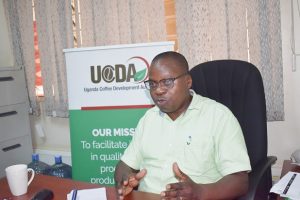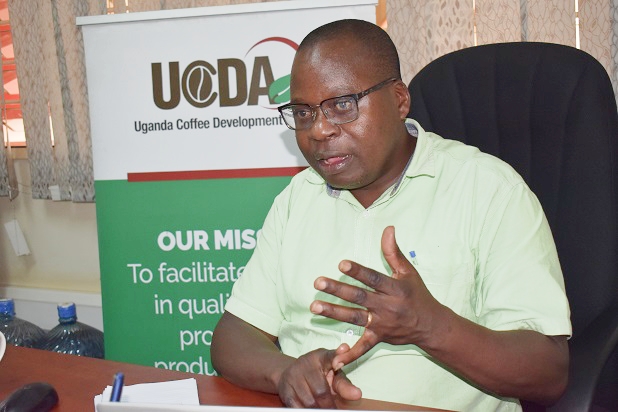Robert Nangatsa, the Extension Manager at UCDA during an interview with Business Focus
On 5th December 2022, the European Union (EU) Parliament approved the EU Regulation for deforestation-free products (EUDR) to ensure supply chains remain free from products that cause deforestation or forest degradation.
The EUDR which takes effect on 1st January 2025 requires that exporters of commodities such as coffee, cocoa and their derivatives must submit specific documents to export to the EU market. EUDR will be implemented retrospectively and commodities like coffee that were planted on deforested land from 2021 will not be given access to the EU market. Considering the fact that coffee is one of the leading foreign exchange earners for Uganda, farmers and other stakeholders along the entire coffee value chain are concerned about whether Uganda will comply with the EU regulation within less than five months. The EU market buys over 60% of Uganda’s total coffee exports. Uganda’s coffee exports for Financial Year 2023/24 totaled 6.13 million bags worth US$ 1.14 billion compared to 5.76 million bags worth US$ 846.02 million in the previous year (Financial Year 2022/23).
In this exclusive interview with Business Focus, Robert Nangatsa, the Extension Manager at UCDA responds to a number of questions boggling the minds of coffee stakeholders. He is confident that UCDA with support from the Government and development partners will register all coffee farmers and other key players before 31st December 2024.
Below are the excerpts from the interview:
Q: The EUDR will mainly affect the coffee sub-sector in Uganda. I understand the EU declined to approve the Territorial Approach (TA) Uganda was proposing to use in order to be compliant. Why did the EU decline the TA?
A: The EUDR aims to ensure EU’s supply chains remain free from products from deforested land; all imports to the EU like coffee must not have been cultivated in an area which once had a forest. This regulation entered into force on 29th June 2023 and it is going to come into effect on 31st December 2024. We are basically remaining with less than 150 days to comply. Because of the urgency and the need to comply, UCDA first considered a short term solution called the Territorial Approach. We wanted to know whether coffee was the major contributor to deforestation. Through bi-lateral engagements with one of the biggest buyers of coffee, JDE Peet’s and another research company, Enveritas, the entire country was mapped; all the coffee plots were mapped using satellite imagery. The Territorial Approach marked polygons around the coffee plots and selected GPS locations. These points were then entered into a system to create a map of the coffee area, which was overlaid on Uganda’s forest map to identify which plots are located within a forest. That was successfully done and the outcome was not worrying for Uganda. It put Uganda in a very good position. It was clear that coffee growing is not a major contributor to deforestation since only three plots of coffee were found to be non-compliant. Out of the three plots, only one plot had mature coffee. We engaged with the farmer and local authorities and negotiated compensation for this farmer to remove the coffee so that we build a case to the EU. However, the EU said they require full or complete traceability with evidence. The system they have approved is where there’s complete traceability right from the farm.
Q: This means Uganda has to go for the Traceability System. How prepared is UCDA to register farmers and other players within the remaining period?
A: We have continued to pursue the more sustainable and long term approach which is full traceability of the coffee. We have been working very closely with the private sector from the time this regulation was announced. We convened a meeting for all the stakeholders where exporters, development partners, cooperatives/ farmer associations, traders and Government came together to deliberate on how we can comply to this regulation. That meeting identified eight accompanying measures and resolved to have a National Task Force on EUDR and the EU’s Corporate Sustainability Due Diligence Directive (CS3D) which incorporates the principles of sustainability; environmental, governance, economic and social aspects.
The task force which is co-chaired by UCDA and the private sector developed a National Action Plan which brought out the activities and roles of each representative. The action plan was validated and the first support came from Government of Uganda through the budget for 2024/25 where Shs13.9bn out of the Shs35bn required to establish the National Traceability System, was allocated.
Our next steps include enlightening stakeholders about the implications of the regulation and the importance of registering farmers, farms and other value chain actors for compliance. If we don’t act now, we may lose the biggest market for our coffee. The EU currently consumes over 60% of Uganda’s coffee exports.
Q: Coffee stakeholders are not feeling your swiftness! We have less than 5 months to the deadline. When do you intend to start registering farmers?
A: You can only see how fast we are if you are part of the process. I can tell you very many things have already taken place. We have mobilised resources and defined the strategy which we are going to use to ensure compliance.
We have started registering farmers, and this is the preliminary phase before we roll out the program nationally.
We need to ensure that the data we collect is authentic and complies to the standards.
Q: I understand some private players mainly exporting companies are already registering farmers. Is UCDA working closely with them?
A: Exporting companies work with local farmers. So they have records of the farmers they work with. However, the full roll out of the national registration of coffee farmers will be launched very soon. We expect to register 1.8 million coffee households with the funding from the Government of Uganda and support from development partners.
Q: What kind of information will be captured during the registration of farmers?
A: We will focus on the location of the farmer and the farm where we shall pick polygons that will help us to know the size of the land. For traceability, we must be transparent. The farmer and farm will each have a unique identifying number which will help to ensure there is no duplication of data collection.
We shall also capture the type of coffee grown, Robusta or Arabica. We shall also need to know the age of the coffee. These are all efforts intended to bring transparency in the supply chain.
Q: Who will be responsible for data storage?
A: Before the EUDR, UCDA was already mandated under the National Coffee Act, 2021 to collect data and build a data depository for all coffee farmers and other value chain actors. The data parameters or requirements for EUDR, such as the GPS location and coffee polygons, are already incorporated. We are therefore not starting from scratch. We have estimated that in the next five months, we should have covered the entire country in as far as data collection is concerned.
We are doing system enhancements and integration simultaneously to have the traceability module incorporated in the national Geo Spatial System.
Q: What will happen to farmers who will not have been registered by December 2024?
A: Our target is to leave no one behind and that’s why the money from Government comes in handy. We will comb all the areas beginning within the top coffee growing regions. As UCDA, we shall ensure that all areas are covered.

Robert Nangatsa, the Extension Manager at UCDA
Q: The EUDR clause on deforestation has been interpreted differently. What constitutes a forest under the EUDR?
A: There are parameters used to define what a forest is under the EUDR. One is the size of land – anything above 0.5 hectares (above one acre). The second parameter is canopy cover; that is, if it is more than 10% cover and another parameter is the height of the trees; that is, if they are above five meters, that is categorized as a forest. The EUDR aims at halting deforestation and protecting the environment to reduce carbon emissions. So, whether it is commercial/artificial or natural forest, as long as it falls under the above definitions, you are not supposed to cut it and plant coffee or any other crop for that matter.
Q: What advice do you have for farmers who are cutting eucalyptus to plant coffee?
A: Those cutting eucalyptus to plant coffee should know that their coffee will not be compliant. The EUDR definition of a forest does not exclude artificial or commercial forests. Our advice to farmers is that they should not cut down forests to plant coffee.
Q: At what stage will an individual farmer know his or her coffee is compliant or not compliant with EUDR?
A: Farmers who clear forests to plant coffee such as the one I mentioned earlier are non-compliant and will not be able to access the EU market. We will sensitise farmers on what needs to be done in such cases. It is therefore important that farmers comply and allow our extension officers to map their land and pick the coordinates. The information we collect (GPS and polygons) is what we shall submit on the due diligence certificates for the EU to verify.
Q: This law may push local small scale traders out of business. This stuff may be complicated for them. How is UCDA helping them?
A: UCDA is here to ensure that there’s no exclusion in business. We have to build capacity. Traders should anticipate that it will no longer be business as usual. In the current situation, everybody can buy coffee. However going forward one will have to fulfill some requirements. Farmers and their farms will be assigned unique identifiers or codes upon registration. Traders will also be registered to enable us to know how coffee is moving. Just like the National Identification Number (NIN), the code is unique to you or your plot. When a trader buys coffee from a farmer, he will ask for their unique identifier. The traders will need a smartphone to link to the national registry to identify the farmer they are buying the coffee from and enter the transaction including the farmer and farm codes, number of kilos bought and the price into the traceability system.
So, the EUDR doesn’t exclude anyone, but calls for capacity building among the various players along the entire coffee value chain. The national system will be accessible to anyone along the value chain. The exporter will not buy your coffee without confirming the required details about the farm. The registration isn’t about only farmers, but all the value chain actors involved. The primary and secondary factories are already digitally mapped.
Q: You already did the mapping of the entire country. What are the main areas/regions with the highest plots that are non-complaint? And how is UCDA planning to handle the affected farmers?
A: The non-complaint plots of coffee were found in Mityana, Mpigi and areas around Mount Rwenzori or Elgon. The EUDR works retrospectively. Any coffee planted before 2020 is safe, but from December 2020 to-date , if you cut a forest and planted coffee, that coffee is not compliant and will not be accepted in the EU.
The National Forestry Authority (NFA) is mapping the forest areas. If we find a farmer whose coffee is not compliant, we will work with that farmer to remediate the process by supporting the farmer to replant the trees that were removed in that area and provide inputs to plant coffee in another area if they have more land. We do not want farmers to completely lose a livelihood. As a country, we want to secure the EU market because we don’t want to lose the much-needed foreign exchange. We have the remediation protocol in place which we are going to disseminate to the farmers. This is going to be for a period of about one to two years.
Your last word…
The EUDR shouldn’t be misinterpreted as a monster as some people thought. It has very good intentions. It is meant to reduce environmental degradation to ensure the sustainability of the environment. We should all embrace it and work collectively as a country to comply right from the farmer, the middle man, the processor, the exporter and the Government who receive the revenue from coffee. As we go into farmer registration, I call upon all the farmers to pick interest and get to understand the implication of this law and provide the maximum cooperation especially for us to be able to successfully conduct the mapping exercise. We don’t have alternative markets that will substitute the EU market in just two or three months. The information collected will also help us to plan well for this sector because as I speak now we don’t know the exact number of coffee farmers in the country. We don’t know exactly how many coffee trees there are. I want to appreciate the private sector players who are already working with us to ensure that we comply and I am sure we will comply if we all work together.







What are the requirements needed for coffee exporters before the execution of the coffee bond
What happens to new members who have hardly made three months into coffee growing? Should they also be included in the data base?
The european union is targeting Uganda coffee to be eliminated from their markets because of the anti homo law like what they did to the speaker of Parliament citing corruption yet there is no proven case of corruption against her.
Saying the EU requires only complete traceability with evidence is misleading and not true. Misleading companies that are not able to trace every part of their coffee commodity can put them in Jeopardy. It would be great to refer to the most recent and past FAQ versions as released by EU to give out correct communication.
Let’s work together for the good of our coffee farmers and for the good of our country
Why can’t Africa also reject all European-produced products whose manufacturing led/leads to the release of carbon into the atmosphere, causing global warming and consequently climate change? The whole world, especially developing Global South, are suffering the effects of bad industrial manufacturing practices by Europeans, Americans, Chinese, Indians and Canadians.
EUDR is the best way of mitigating climate, and since deforestation has been one of the cause. Let the regulation act and we enjoy the nature 🙏🙏
The european union may impose the regulations to Uganda in retaliation for the anti homo law Uganda passed last year
The speaker of Parliament is under sanctions citing corruption yet there no single proven case of corruption against her where is the fairness? My advice to Uganda law makers is to reverse the anti homo law